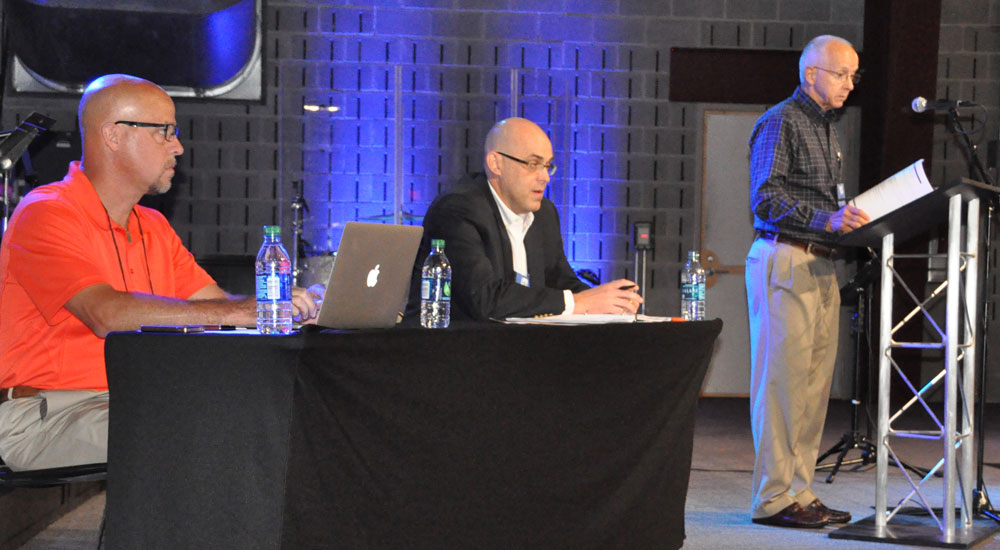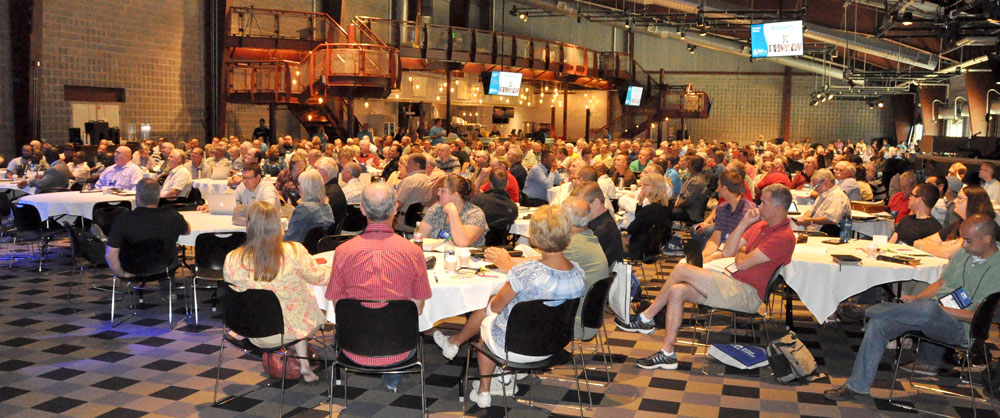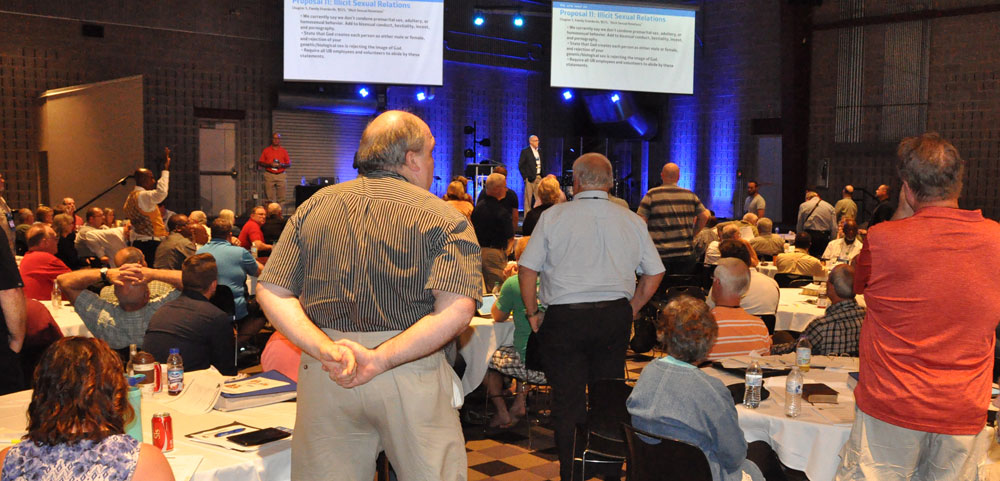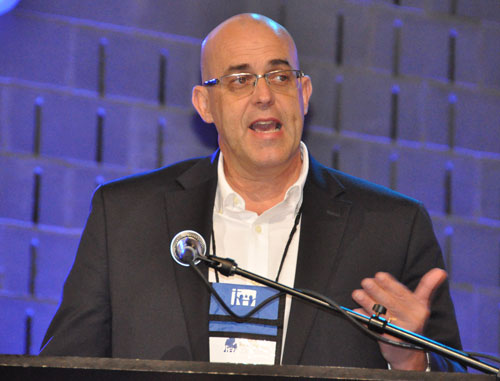19 Aug Step-by-Step Through the 2015 Business Meeting

Todd Fetters leading the National Conference business session on July 16, 2015.
Steve Dennie, Director of Communications
The business meeting of the 2015 US National Conference was held on Thursday, July 16, at ResLife Church in Grandville, Mich. The official minutes have now been submitted by Roxton Spear, the conference recording secretary.
Using the minutes, we updated the United Brethren Discipline. You can read the 2015-2017 Discipline online and download a PDF version to print out. The complete Discipline can also be read in the UB App.
Here is a blow-by-blow report of the business meeting, with a focus on how delegates dealt with the 13 proposals that came before them. All of the reports they considered can be viewed online.
Report 2: Rules & Procedures
Todd Fetters, chairman, called the meeting to order at 9:12 am.
After the roll call, the delegates approved the Rules & Procedures report, which explained how the meeting would be conducted. This report was published in mid-June. Two amendments were made–to recognize Todd Fetters as chairman (in place of Bishop Phil Whipple) and Paul Hirschy as vice chairman (in place of Lester Smith, who was still struggling with illness). Other officers:
- Recording secretary: Roxton Spear, senior pastor of Mongul UB church (Shippensburg, Pa.).
- Parliamentarian: Craig Burkholder, senior pastor of Hudson UB church (Hudson, Ind.).
Report 11: ELT Minutes
Todd Fetters turned the chair over to Paul Hirschy to process the ELT minutes (Report 11) from the past two years. There was a motion to adopt the ELT minutes.
After some discussion, a motion was made to enter into executive session to discuss circumstances related to the resignation of Bishop Phil Whipple. Executive session would be limited to clergy delegates, lay delegates, and advisory members. Everyone else was asked to leave the room.
Gary Dilley, a member of the executive committee of the Executive Leadership Team, read a letter of explanation from the ELT. Questions were answered, and there was discussion. Nothing was recorded in the minutes.
Executive session ended at 10:26, and a break was called. Business resumed at 10:42 with a motion to close the executive session.
The delegates voted to approve the ELT minutes, with the exception of the appointment of Todd Fetters as Interim Bishop.

Paul Hirschy presiding over the conference.
Interim Bishop
There was much discussion basically around the question, “What happens now?”
Eventually Steve Fish, teaching pastor at Emmanuel Community Church (Fort Wayne, Ind.), made this motion: “I move the United Brethren National Conference affirm the ELT’s decision to appoint Todd Fetters as the Interim Bishop, and that this body determine that time-frame to begin on August 7, 2015, until the meeting of the next United Brethren National Conference in 2017.”
There was more discussion, including two attempted amendments, both of which failed:
- To change the effective date from August 7 to July 16, which would make the appointment start immediately.
- To drop the word “interim” from the title.
The original motion passed. Bishop Emeritus Ron Ramsey then came forward to lay hands on Todd Fetters and pray for him. Todd Fetters then shared some remarks with the conference.
Bishop Hirschy returned the chair to Todd Fetters. Hirschy was given a standing ovation for leading the conference through the ELT minutes, the executive session, and the discussion surrounding the appointment of Todd Fetters as Interim Bishop.
Report 41: Election of ELT Members
Chairman Fetters turned attention to the 13 proposals which had been submitted, all contained in Report 41. Most of the rest of the business meeting would surround consideration of these proposals.
Fetters started with several proposals which needed to be processed before the delegates could vote on members for the 2015-2017 Executive Leadership Team.
Proposal 1 came from the Executive Leadership Team. It did several things:
- Increased the terms of elected ELT members from two years to four years.
- Implemented staggered terms, so that half of the elected members would be chosen every two years.
- Set terms of two years for the four members to be appointed by the ELT.
- Stated that the four appointees would be nominated by the bishop and appointed by the ELT.
- Established term limits of eight years for ELT members (except for the bishop).
- Stated which four members would be elected during the national conference when the bishop is elected, and which four members would be elected during the in-between national conference.
An amendment was offered to change how the four appointed members were chosen—that they would be both nominated and appointed by the ELT, rather than nominated by the bishop. The amendment failed.
Proposal 1 passed as presented. Then the delegates quickly passed Proposal 2, a one-time proposal required to implement the staggered terms. It specified which members elected in 2015 would serve two-year terms, and which would serve four-year terms.
Proposal 4: Nominating Committee
A new paragraph was added to the duties of the Executive Leadership Team. It gave instructions on how and by whom the ELT ballot would be compiled. It passed as presented:
The Executive Leadership Team shall appoint a nominating committee to assemble a ballot for submission to the US National Conference. The nominating committee shall notify the membership of the US National Conference of its nominations at least 30 days prior to the US National Conference.
Reports from the Bishop’s Office
The delegates next heard two reports from the Office of the Bishop.
- Todd Fetters presented the report of Bishop Phil Whipple, who was not in attendance.
- Jeff Bleijerveld, director of Global Ministries, presented his report of the work of Global Ministries during the past two years.
Nominating Committee Ballot
The ballot for the Executive Leadership Team was distributed. Delegates made their selections for eight positions on the ELT: a layperson and a minister from each of the four regions.
Special Presentations
Before breaking for lunch, the delegates heard three more presentations:

- Brad North gave a few words on behalf of Camp Living Waters in Luther, Mich. North is the director of this camp, which was fully owned by Michigan Conference until 2005, when it became an independent entity (as did the other fulltime camps).
- Dr. Anthony Blair (right) spoke on behalf of Evangelical Seminary (Myerstown, Pa.), of which he is the president.
- Bishop Paul Hirschy introduced a memoriam video showing notable United Brethren people (mostly pastors and missionaries) who had passed away since the July 2013 US National Conference.
Lunch
The delegates broke for lunch at 12:13. The meal was sponsored by Huntington University. Dr. Sherilyn Emberton, president of HU, gave some remarks.
The conference reconvened at 1:26 pm.

The elected ELT members. L-r: Dennis Sites, Sherwood Cook, Greg Voight, Todd Rhoades, Randy Carpenter, Bob Tobey, Gary Dilley, Kevin Smith.
ELT Ballot Results
Todd Fetters read the results of the ELT ballot. The name is bold is the person elected.
- East District clergy. Keith Elliott:72. Dennis Sites: 217.
- East District laypersons. Sherwood Cook: 167. Darryl Gross: 111.
- West District clergy: Gary Dilley: 254. Troy Green: 38.
- West District laypersons. Tomra Cardin: 135. Kevin Smith: 138.
- North District clergy: Darrel Bosworth: 98. Randy Carpenter: 193.
- North District laypersons. Bob Tobey: 176. Josh Willard: 107.
- Central District clergy. Andy Sikora: 126. Greg Voight: 160.
- Central District laypersons. Todd Rhoades: 201. Dallas Ziegler: 80.
Office of the Bishop Reports (Continued)
The delegates heard several more reports from directors at the National Office.
- Todd Fetters presented the Ministerial Licensing report on behalf of director Gary Gates, who was not in attendance. Public recognition was given to persons who had been ordained or received a national conference, specialized, or provisional license during the past two years.
- Steve Dennie reported as director of Communications.
- Sherilyn Emberton reported as director of Higher Education.
- Marci Hammel reported as Finance director.
- Todd Fetters reported as director of National Ministries.
A motion passed to receive the various reports from the Office of the Bishop. All of the directors, except for the Director of Higher Education, are appointed by and report to the bishop.

The business meeting of the 2015 US National Conference.
Proposal 3: Chairing the ELT
Back to the proposals. Proposal 3 passed as presented. It made changes in the Discipline chapters on the Bishop and the Executive Leadership Team.
There were two main changes:
- Remove the requirement that the bishop chair meetings of the Executive Leadership Team. There was a lot of discussion about this aspect. Now, the bishop can still chair the ELT, but it’s not necessary.
- Create an executive committee for the ELT. In practice, the ELT has long functioned with an executive committee, but it wasn’t specifically mentioned in the Discipline.
The following paragraph was added which specifies the appointment and constituency of the executive committee.
The Executive Leadership Team, following the US National Conference, shall appoint an executive committee from its membership, not to include the bishop. The executive committee shall consist of a chairperson, assistant chairperson, and secretary. These persons will be appointed to two-year terms, and may be re-appointed to a maximum of eight years.
Proposal 5: Filling Vacancies on the ELT
This proposal added a new paragraph in the ELT chapter which explained how vacancies on the ELT would be filled: “The executive committee will fill vacancies on the Executive Leadership Team. The ELT may suggest persons to be considered for appointment.”
Proposal 6: Qualifications for Bishop
This unsuccessful proposal sought to change the qualifications for bishop as stated in Chapter 16, “The US Bishop”. The proposal read (with the new content in bold):
The US National Conference shall elect an ordained minister to serve as US bishop for a four-year term. This person must meet the biblical qualifications for eldership expressed in 1 Timothy 3:1-7 and Titus 1:5-9. This person must be an effective leader, administrator, and communicator, and have a vision and plan for church growth and multiplication.
The proposal also sought to remove the requirement that the bishop live in the area of Huntington, Ind. The proposal lost on a voice vote.
Proposal 7: Nominating Committee Duties
Proposal 7 required that the ballot for bishop be publicized 60 days before the US National Conference, rather than just 30 days. It passed as follows: “The nominating committee shall notify the membership of the US National Conference of its nominations at least 60 days prior to the US National Conference.”
Proposal 8: Amendments to the Ballot for Bishop
The Discipline allows for persons to be nominated for bishop from the floor. There were two such nominations in 2013, both of which were declined by the persons nominated. Proposal 8 sought to remove that possibility. These reasons were given for not allowing nominations from the floor:
- A nominee “from the floor” has to make an instant potential life-changing decision, without the chance to talk it over and pray with family, his church, and friends.
- The nominating committee has limited time to interview a candidate and may not be able to complete due diligence.
- To say “yes” with a church delegate present could give a false impression that the nominee is not happy in his current pastorate.
- The rationale included with the proposal stated, “The nominating committee should be trusted that they have put forth the best available candidates. This is what they are appointed for and that they’ve had ample time to do.”
The proposal was to delete entirely the paragraph which allowed the nominating committee report to be amended from the floor.
At the same time, there has been ongoing concern about the fact that in 2009 and 2013, the ballot for bishop had just one name. The strong preference is for multiple names.
After quite a bit of discussion, the delegates voted to keep a paragraph on “Amendments to the Report,” but to replace the current wording with the following:
The nominating committee report may be amended by addition from the floor of the US National Conference if there is only one name on the ballot.
So, persons can still be added to the ballot from the floor—but only if the ballot, as presented by the Nominating Committee, includes just one name.
Proposal 9: Cohabitation
The Pastoral Ministry Leadership Team approved for the Discipline a new statement on “Cohabitation.” The ELT made a few minor changes, and the statement came to the National Conference in this form:
Cohabitation is an unmarried, unrelated couple living together. Cohabitation circumvents God’s plan for family life by simulating the marriage relationship without the covenantal commitments associated with marriage (Genesis 2:18). Even when celibacy is intended, cohabitation increases the temptation for sexual sin and fails to avoid the appearance of evil (1 Corinthians 6:18, 1 Thessalonians 5:22). Members must avoid cohabitation prior to marriage. We urge our leaders to teach and counsel about the hazards of cohabitation. We also recognize that there may be situations in which a platonic, cohabiting relationship may be necessary, such as a caregiver-patient relationship.
This proposal had been discussed at the four regional meetings held in May and June, and there were some concerns. In particular, it was felt that the statement might prohibit some innocent living arrangements, such as an elderly woman with male boarders, or even two members of the same sex sharing an apartment.
With that in mind, Tom Datema, pastor of the UB church in Zanesville, Ind., crafted a substitute proposal which focused not on the living arrangement, but on the nature of the relationship. It came before the delegates as a Supplementary proposal, which meant it wouldn’t be considered unless a delegate brought it to the floor. Datema did just that. It read:
We believe that simulating the marriage relationship by living together without the covenantal commitments associated with marriage circumvents God’s plan for family life (Genesis 2:18). Even when the couple’s intention is to remain sexually pure, cohabitation increases the temptation for sexual sin and fails to avoid the appearance of evil (1 Corinthians 6:18, 1 Thessalonians 5:22). Members must avoid cohabitation prior to marriage.
A motion was made to remove the words “and fails to avoid the appearance of evil,” but the amendment failed.
The substitute Cohabitation proposal passed.

Proposal 10: Same Sex Marriage
It was 2:50 pm, with a scheduled adjournment of 4:30. Now came the longest debate of the conference.
In May, during the regional meeting in Sunfield, Mich., two proposals were presented which focused around the subject of same-sex marriage. The proposals came from Jeff Reser, pastor of the East Washington UB church in Ashley, Mich. He later officially submitted the proposals, and they were included in the proposals for revising the Discipline.
The first proposal added a third paragraph to the existing statement on “Marriage.” It would do the following:
- State that we “recognize” only marriages between “a genetic, biological man and a genetic, biological woman.”
- State explicitly that UB ministers can participate only in weddings between a biological man and a biological woman.
- Require that United Brethren church properties not be used to host same-sex weddings.
- Hopefully, provide legal protection for pastors.
Proposal 10 passed, with amendments to add “genetic, biological” in four places in the last two sentences. The entire statement on Marriage now reads as follows (only the third paragraph is new):
¶122 Marriage
Marriage was instituted by God and is regulated by him. For this reason, the Church must resist all attempts to alter marriage from what the Bible has revealed about it. The purpose of marriage is companionship between a man and a woman (Genesis 2:18) in a permanent relationship which can end only when one of the partners dies.
A Christian should marry only another Christian (1 Corinthians 7:39, 2 Corinthians 6:14). Their relationship is to express God’s original intention for marriage: the wife’s role alongside her husband as an equal.
Because God ordained marriage and defined it as the covenant relationship between a man, a woman and himself, the Church of the United Brethren in Christ USA will only recognize marriages between a genetic, biological man and a genetic, biological woman. Further, the ministers classified with the authority to conduct weddings shall only participate in weddings and solemnize marriages between one man and one woman. Finally, the facilities and property of churches in covenant with the Church of the United Brethren in Christ USA shall only host weddings between one genetic, biological man and one genetic, biological woman.
Proposal 11: Illicit Sexual Relations
This proposal enlarged the list of sexual practices we don’t condone, adding bisexual conduct, bestiality, incest and pornography. In addition, it added four paragraphs prompted by the same-sex marriage issue. It was considered a sister proposal to Proposal 10.

Todd Fetters
After much discussion, including one successful amendment and one unsuccessful amendment, Proposal 11 was tabled in favor of a task force to examine a variety of related issues. Todd Fetters raised the idea of the task force during the discussion of Proposal 11, and suggested that its work could include the following:
- A comprehensive and biblical view toward the many forms of sexual orientation and gender identity— over 50 such categories now, by some counts.
- Issues involving the recognition of marriages by churches and by the state.
- A fresh look at our current Discipline statements on family-related issues.
- Legal protections for pastors and churches regarding such areas as same-sex marriages, the use and renting of church facilities, and employment.
- Attitudes and approaches members and churches should take.
- Any recommended statements to include in the Discipline as early as 2017.
- Any recommended revisions to the Pastoral Ministry Handbook.
The delegates liked the idea, and passed a motion to create a task force to deal with issues of sexual orientation and illicit sexual relations. The Executive Leadership Team will create the task force, which will report back to the ELT and then to the US National Conference in 2017.
Proposal 12: UB Ministerial Association
The Discipline has stated, “All ministers are required to maintain membership in a local United Brethren church. Failure to do so will render the ministerial license null and void.”
That applied even to retired persons living in places far removed from a UB church, and to ministers serving in other settings (missionaries, military chaplains, college professors, persons pastoring a non-UB church while awaiting a future assignment within the UB church, etc.). It created a situation where, to maintain their license, persons were often unable to fully participate in the church they actually attended, because they could not become members of that church (we don’t allow dual membership).
The Pastoral Ministry Leadership Team decided this needed to change. They created what they call the United Brethren Ministerial Association. Ministerial licenses would be kept at the national office, rather than at a local church. In this way, you could join the non-UB church you attend without jeopardizing your ministerial license.
Upon leaving a UB pastorate, both the pastor and spouse would have their membership transferred to the national office. Then, upon being assigned to a new UB church, they would automatically become members of that congregation.
To make this happen, the delegates deleted the statement quoted above, and in its place created a new paragraph:
All persons credentialed by the Pastoral Ministry Leadership Team are automatically members of the United Brethren Ministerial Association as outlined in the Pastoral Ministry Handbook. All such ministers must maintain the requirements for membership in the United Brethren Ministerial Association. Failure to do so will render the credentials null and void.
This idea passed unanimously.
The Pastoral Ministry Leadership Team already approved the details to be inserted into the Pastoral Ministry Handbook, pending approval by the National Conference.
Proposal 13: Restrictions on Ministers
In 1989, efforts began to remove the requirement that UB members totally abstain from drinking alcohol. After coming before several national conferences, the idea finally passed in 2005. However, the restriction remained for UB ministers, as stated in the Discipline:
No person shall be approved or retained as a licensed minister in the Church of the United Brethren in Christ, USA, whose life is not in harmony with the established moral and social standards of the church as defined in the Discipline. In addition, ministers are not permitted to use tobacco, beverage alcohol, and illicit drugs, or to engage in any immoral conduct, and their marriage relationships must be in harmony with the teachings of Scripture as defined in the Discipline.
Proposal 13 sought to delete the second sentence (in bold), which would remove from that paragraph not only the ban on drinking for ministers, but the ban on using tobacco. It would also remove statements about illicit drugs, immoral conduct, and the marriage relationships of ministers—all of which are covered in other parts of the Discipline and Pastoral Ministry Handbook. A lot was packed into that sentence.
It was already nearly 4:15 when the proposal hit the floor, with adjournment just 15 minutes away—not enough time for what people anticipated would be yet another lengthy floor debate.
The delegates voted to defer action on Proposal 13 until 2017.
Concluding
Gene Reineman came forward to say a few words about Rhodes Grove Camp in Chambersburg, Pa.
Then came a motion to adjourn. The 2015 US National Conference officially adjourned at 4:19 pm.

No Comments